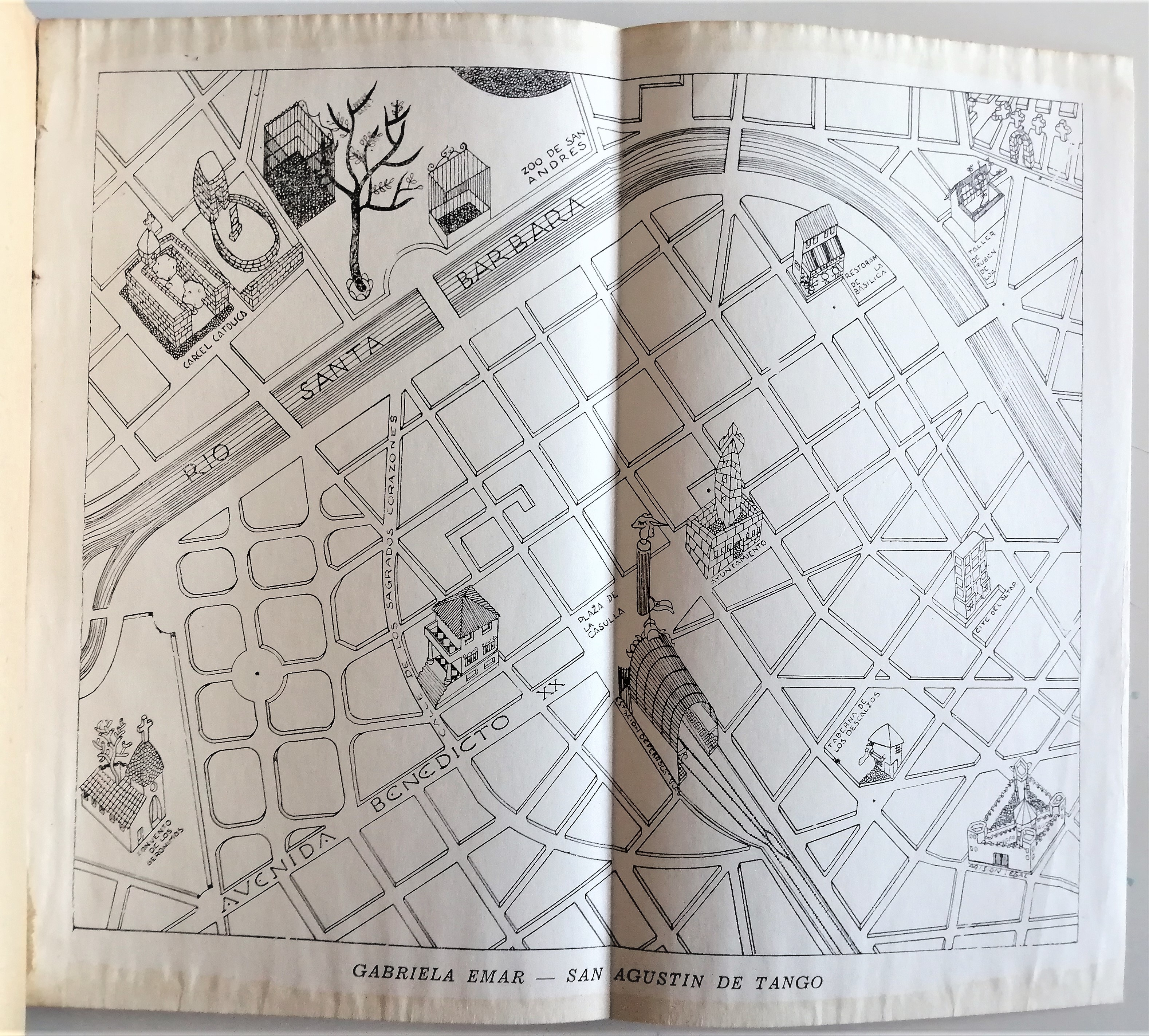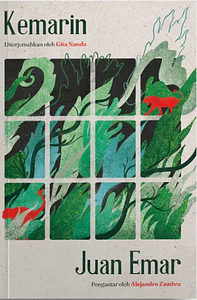Take a photo of a barcode or cover
ruangtitikkoma's review
adventurous
challenging
dark
emotional
funny
slow-paced
- Plot- or character-driven? Plot
- Strong character development? Yes
- Loveable characters? N/A
- Diverse cast of characters? No
- Flaws of characters a main focus? Complicated
3.75
Setengah bagian awal saya suka banget. Kocak. Macam orang melantur ke mana-mana, tapi asik sekali pikiran penulisnya.
Setengah bagian belakang, racauan makin ke mana-mana. Saya mulai tidak terlalu menikmati karena tidak ada humornya menurut saya. Lebih serius dan tidak terarah.
Gaya menulisnya unik. Ibaratnya seorang murid yang diberi tugas mengembangkan karangan untuk satu kata saja. Juan Emar berhasil mengembangkan cerita menjadi sangat jauh dari apa yang bisa kebanyakan orang pikirkan. Untuk satu objek saja, ia berhasil menyelami dengan pengamatan micro, jauh ke dalam semacam lensa mikroskop yang memindai objek teramat kecil.
Tanpa dipisahkan oleh sub-sub judul, cerita2 di buku ini dimulai. Dengan karakter tokoh suami-istri yang bertualang dari satu tempat ke tempat lain, mulai dari ketika melihat peristiwa pemancungan, hingga kembali ke apartemen mereka. Tokoh suami sebagai narator, mencoba mengingat semuanya dengan lengkap, tanpa terlewat. Mulai dari yang terbesar, teraneh, termenakutkan, hingga yang terabsurd. Termasuk menu-menu makanan yang mereka pesan, tiga lalat yang terbang, lima lubang putih di urinoar, dll.
Terjemahan bagus, mengalir dengan smooth, bisa menciptakan suasana yang mungkin juga ingin dimunculkan penulis sehingga pembaca bisa merasakan sisi jenakanya, atau kosongnya sekalipun dalam teks yang cenderung naratif.
Setengah bagian belakang, racauan makin ke mana-mana. Saya mulai tidak terlalu menikmati karena tidak ada humornya menurut saya. Lebih serius dan tidak terarah.
Gaya menulisnya unik. Ibaratnya seorang murid yang diberi tugas mengembangkan karangan untuk satu kata saja. Juan Emar berhasil mengembangkan cerita menjadi sangat jauh dari apa yang bisa kebanyakan orang pikirkan. Untuk satu objek saja, ia berhasil menyelami dengan pengamatan micro, jauh ke dalam semacam lensa mikroskop yang memindai objek teramat kecil.
Tanpa dipisahkan oleh sub-sub judul, cerita2 di buku ini dimulai. Dengan karakter tokoh suami-istri yang bertualang dari satu tempat ke tempat lain, mulai dari ketika melihat peristiwa pemancungan, hingga kembali ke apartemen mereka. Tokoh suami sebagai narator, mencoba mengingat semuanya dengan lengkap, tanpa terlewat. Mulai dari yang terbesar, teraneh, termenakutkan, hingga yang terabsurd. Termasuk menu-menu makanan yang mereka pesan, tiga lalat yang terbang, lima lubang putih di urinoar, dll.
Terjemahan bagus, mengalir dengan smooth, bisa menciptakan suasana yang mungkin juga ingin dimunculkan penulis sehingga pembaca bisa merasakan sisi jenakanya, atau kosongnya sekalipun dalam teks yang cenderung naratif.
kmperst's review against another edition
4.0
This book reminds me of the time I got high and got close to realizing the meaning of life. The existentialism that continues to build and build while you try to grasp onto some semblance of meaning, until you eventually just accept the unknown for what it is. I don’t know what the meaning of this book is, I don’t know what the main character realized in the last chapter, and I don’t know what the meaning of life is, but I do know that I felt the same emotions and internal struggle while experiencing each of these situations.
so_julka's review against another edition
3.0
is it even a night out if u don’t finish a chilean absurdist book on the tube? also WHAT THE ACTUAL FUCK
anjalikrishnakumar's review against another edition
challenging
funny
medium-paced
- Plot- or character-driven? A mix
- Strong character development? Complicated
- Loveable characters? Yes
- Diverse cast of characters? N/A
- Flaws of characters a main focus? N/A
4.5
So wonderful and bizarre. I feel so comforted by the author and the way he thinks. It feels like it should be odd, how consumed the narrator is by his own thoughts, but it makes perfect when you think about how abstract the nature of life itself is. Everything is arbitrary and yet everything is constant.
saareman's review against another edition
5.0
A Surrealistic Day
Review of the Peirene Press paperback edition (June, 2021) translated from the Spanish language original "Ayer" (1935) published by Editorial Zig Zag

Photograph of the map of San Agustin de Tango drawn by Gabriela Emar as the frontispiece in the original 1935 edition (downsized to 1 page in the Peirene edition). Image sourced from https://www.librosdelayer.cl/productos/detalle/7996/juan-emar-ayer. If you click through to the source, you can examine the map in finer detail.
Yesterday is a day in the life of the protagonist and his wife as they wander around their city of San Agustin de Tango (an almost homophone of Santiago in Chile). The encounters are increasingly bizarre and are interrupted by two meal breaks. Each event ends with the couple encouraging haste in moving on to the next step by trading calls of "Let's go! Let's go!" At the end of the day back at home the protagonist has an existential crisis where he needs to reprocess all the events with the aid of his wife before he can finally go to sleep and be at rest.
I read Yesterday as part of my annual subscription to Peirene Press. Yesterday is the first of Peirene's Metamorphoses series for 2021.
Trivia and Links
If you are reading this prior to June 22, 2021, you can still register and watch the free online book launch for Yesterday by Peirene Press. Translator Megan McDowell joins Chilean poet and novelist Alejandro Zambra – author of the introduction to Yesterday – in a conversation chaired by writer and lecturer in Latin American literature Carlos Fonseca. The event will also include readings in Spanish and English and an audience Q&A.
Translator Megan McDowell may have had this translation 'in the drawer' for quite some time, as an excerpt appeared as early as August 2010 in Words Without Borders. Thanks to Paul Fulcher's excellent review for that link!
Yesterday is told over the course of a 24-hour day, and is thus a so-called "circadian" novel. James Clammer, whose recent novel [b:Insignificance|56042043|Insignificance|James Clammer|https://i.gr-assets.com/images/S/compressed.photo.goodreads.com/books/1606318609l/56042043._SX50_.jpg|87288740] (2021) also takes place during the course of one day, assembled a list of Top 10 Novels Told in a Single Day.
Review of the Peirene Press paperback edition (June, 2021) translated from the Spanish language original "Ayer" (1935) published by Editorial Zig Zag

Photograph of the map of San Agustin de Tango drawn by Gabriela Emar as the frontispiece in the original 1935 edition (downsized to 1 page in the Peirene edition). Image sourced from https://www.librosdelayer.cl/productos/detalle/7996/juan-emar-ayer. If you click through to the source, you can examine the map in finer detail.
Yesterday is a day in the life of the protagonist and his wife as they wander around their city of San Agustin de Tango (an almost homophone of Santiago in Chile). The encounters are increasingly bizarre and are interrupted by two meal breaks. Each event ends with the couple encouraging haste in moving on to the next step by trading calls of "Let's go! Let's go!" At the end of the day back at home the protagonist has an existential crisis where he needs to reprocess all the events with the aid of his wife before he can finally go to sleep and be at rest.
I had begun again at the beginning. I had begun with the guillotine, the guillotine which let to the zoo, which led to lunch which led to Ruben de Loa's studio, which led to the waiting room and the square, which led to dinner, which led to my family's house, which led to the tavern, which led to the pisser, which led to the hole and the fly that tore time in two and illuminated everything, which ... which, no doubt, will make me climb up towards the lime flower tea, doubtless, beacuse this was the truth of how things had happened.So how should one interpret all of this? I thought that I would investigate a possible symbolic approach. I was curious enough to research a bit about the history of Chile in the 1920s and 1930s when it went through the instability of 10 different governments in the space of only a few years (one of them lasting only 24 hours) before some relative democratic stability began from 1932 onwards (at least until the repressive Pinochet regime of 1973-1990). Perhaps each event or repast in the book is symbolic of those events in Chile's history? Or perhaps it is just about one couple's interpretation of it. In any case, I was thoroughly entertained and delighted with my first reading of Juan Emar.
I read Yesterday as part of my annual subscription to Peirene Press. Yesterday is the first of Peirene's Metamorphoses series for 2021.
Trivia and Links
If you are reading this prior to June 22, 2021, you can still register and watch the free online book launch for Yesterday by Peirene Press. Translator Megan McDowell joins Chilean poet and novelist Alejandro Zambra – author of the introduction to Yesterday – in a conversation chaired by writer and lecturer in Latin American literature Carlos Fonseca. The event will also include readings in Spanish and English and an audience Q&A.
Translator Megan McDowell may have had this translation 'in the drawer' for quite some time, as an excerpt appeared as early as August 2010 in Words Without Borders. Thanks to Paul Fulcher's excellent review for that link!
Yesterday is told over the course of a 24-hour day, and is thus a so-called "circadian" novel. James Clammer, whose recent novel [b:Insignificance|56042043|Insignificance|James Clammer|https://i.gr-assets.com/images/S/compressed.photo.goodreads.com/books/1606318609l/56042043._SX50_.jpg|87288740] (2021) also takes place during the course of one day, assembled a list of Top 10 Novels Told in a Single Day.
amarisgrace's review against another edition
3.0
The prose in this book was delightful for the way it shocks you. The way Emar spins his sentences felt like I was being taught to think in a way I had never thought before, which was both thrilling and exhausting. I think I would have loved this book more had I been more mentally ready to rally to his fantastical imagination.
I will say: if I end up with half as a beloved and adoring relationship as the narrator and his wife, I will feel incredibly lucky.
I will say: if I end up with half as a beloved and adoring relationship as the narrator and his wife, I will feel incredibly lucky.
